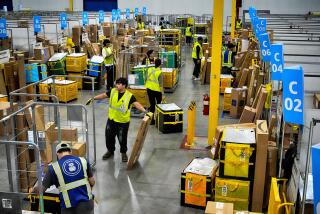Brazil’s Recession Ends, in Hopeful Sign for the Region
- Share via
Brazil’s economy unexpectedly grew 1% in the first quarter, the government said Thursday, ending the country’s recession and boosting prospects for the rest of Latin America.
The expansion in Brazil’s gross domestic product, which came after six months of shrinkage in economic output, is the latest piece of surprisingly good news that has included a steep decline in interest rates, lower-than-expected inflation and a booming stock market.
The report helped boost Brazil’s principal stock index, the Bovespa, by 2.6% to 12,459 on Thursday, its highest close since Oct. 22, 1997. The index has rocketed 146% since January.
Just weeks ago, some pundits were predicting that Brazil would fall into a yearlong recession, with its economy contracting 5% or more. A return of hyper-inflation and the possibility of default, Russia-style, on Brazil’s mountain of foreign and domestic debt were also feared.
Naysayers had good reason to be gloomy when Brazil was rocked by a 42% currency devaluation in January after a $41.5-billion rescue package from the International Monetary Fund failed to placate markets. Brazilian and foreign investors alike fled with about $50 billion in capital over six months.
The faster-than-expected recovery is being pushed by a “virtuous circle” of increased confidence in Brazil that has much to do with monetary policy imposed by new central bank chief Arminio Fraga, said Sebastian Edwards, a UCLA professor and former chief Latin America economist for the World Bank.
Fraga persuaded international lenders to extend credit to Brazilian borrowers, which helped avert a default. That, in turn, eased pressure on the currency and interest rates--which have eased to 27% from a high of 44.5% in February, Edwards noted--and foreign capital is pouring back into Brazil.
Brazil’s leaders have also been helped by good news on the labor front. Instead of mass strikes for higher wages, as some had predicted, unions have gone along with government jawboning to hold the line on salaries, Edwards said .
The official national unemployment rate dropped to 7.9% by the end of March, down from 10.2% in December.
Brazil’s recovery, though fragile, also marks a milestone in the global economic crisis. Several Asian nations, notably South Korea and Thailand, have shown signs of recovery, and Indonesia recently reported first-quarter economic growth.
The first-quarter recovery of the largest Latin economy was led by a 17% increase in agricultural production compared with the 1998 fourth quarter. Much of the added farm production is being exported, as Brazil’s January devaluation makes those goods’ prices more competitive overseas.
Although industrial output and construction activity were about even with the previous three months’, economists were impressed.
“We were looking for much lower numbers, maybe a 3% to 4% drop,” said Jorge Mariscal, investment strategist with Goldman Sachs in New York. These numbers indicate that “the recession in Brazil is officially over.”
Even with continued quarter-to-quarter growth, Brazil’s economy, under the best of scenarios, is still likely to end the year 1% to 2% smaller than it was in 1998. But that’s far better than the consensus of just weeks ago.
While expressing caution about Brazil’s nascent recovery, UCLA’s Edwards said the improving picture means good things for neighboring Latin American countries that rely to varying degrees on the Brazilian market.
South America’s regional economy is also being helped by improvement in Asia’s economy and by higher prices for commodities such as oil and copper, on which Latin economies depend, Edwards said.
Mariscal cautioned that Brazil must guard against complacency. “Their tendency is to forget their homework and start doing the samba and find themselves in trouble again ,” he said.
More to Read
Sign up for Essential California
The most important California stories and recommendations in your inbox every morning.
You may occasionally receive promotional content from the Los Angeles Times.













